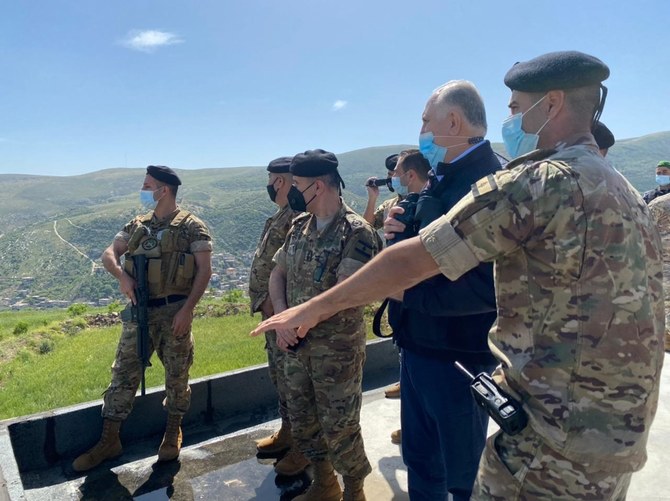
By NAJIA HOUSSARI -- arabnews.com -- BEIRUT: Lebanese Caretaker Interior Minister Mohammed Fahmy told Arab News that he could not deny or confirm the involvement of Hezbollah in the smuggling of the Captagon shipment to Saudi Arabia, an operation thwarted by the Saudi authorities in April. Fahmy stressed that “investigations are underway, and their contents cannot be disclosed until now, fearing for the integrity of the investigation. Upon completion of all data and the initial investigation, we will speak. We hope that we will get the results soon.” The minister of interior inspected on Sunday the illegal crossing points on the borders with Syria, starting from the Al-Fawj border center in Shedra, Akkar district (the far north of Lebanon) to the town of Ras Baalbek (eastern Lebanon).
He listened to a briefing from the regiment commander, Col. Milad Saliba, about the military situation, the conditions of the legal crossing points, and the illegal routes at the Lebanese-Syrian borders, through which smuggling operations take place in the region. Fahmy said that “cross-border smuggling is a chronic problem that goes back to before the year 1975, and no country can control its borders 100 percent.” He said: “But we will activate border controls based on the directives of President Michel Aoun and the orders of the Supreme Defense Council, and anyone responsible for any act of corruption or smuggling will be held accountable.”
The minister’s inspection tour comes after Saudi Arabia decided on April 23 to ban the import and transit of Lebanese fruits and vegetables due to an increase in drug smuggling operations and after millions of narcotic pills (Captagon) were seized inside the pomegranate fruits. Fahmy traveled by a military helicopter to the Bekaa region to inspect the crossings and the sites where smuggling operations are active. He met with officers from the second border regiment command and listened from the regiment commander, Col. Mohammed Dahboul, to a detailed briefing about the security and military realities and the situation on the crossings. He concluded his tour by inspecting the army’s control tower in the Mastaba area in the outskirts of El-Qaa-Hermel. In 2019, Lebanon estimated the number of illegal crossings on all its borders with Syria as 12. These illegal crossings have seen an increase in activity during the last two years due to the chaos and illegal weapons in the environment that supports it, especially in the northern Bekaa, where Hezbollah enjoy the freedom of movement and entry to Syrian territory through their own crossings. Fahmy said: “All these points are being monitored and are being addressed.” Smuggling has become active in both directions in light of the decline in the economic situation in the two countries. Minister Fahmy said: “In the past, smuggling used to take place from Syria toward Lebanon, but today, it is reversed, and the security forces are pursuing smugglers who devise new methods every day.”
A security source, however, told Arab News: “Smugglers from the Lebanese side benefited from official Lebanese basic items subsidies, especially fuel, medicine, and flour, and have been smuggling them into Syria to make a profit due to the price difference. Smugglers also use these crossings to bring cars stolen from Lebanon to Syrian territory. Lebanon "was used as a platform for smuggling abroad. Food, agricultural products, eggs, dairy products, cheese, and medicine pass through these illegal crossings into Lebanon, and some of them are Iranian-made, in addition to smuggling humans.” The source said: “Controlling these crossings is difficult. As soon as we discover a crossing, the smugglers will be guided to another crossing in the barren and harsh areas. They know these areas very well because they are native residents, or they facilitate the work of smugglers.” Although Hezbollah declares that it has nothing to do with drug dealing, they turn a blind eye to prominent dealers in the northern Bekaa.